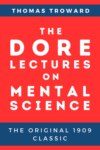Kitabı oku: «THE EDINBURGH LECTURES ON MENTAL SCIENCE», sayfa 2
THE UNITY OF THE SPIRIT.
We have now paved the way for understanding what is meant by "the unity of
the spirit." In the first conception of spirit as the underlying origin of
all things we see a universal substance which, at this stage, is not
differentiated into any specific forms. This is not a question of some
bygone time, but subsists at every moment of all time in the _innermost_
nature of all being; and when we see this, we see that the division between
one specific form and another has below it a deep essential unity, which
acts as the supporter of all the several forms of individuality arising out
of it. And as our thought penetrates deeper into the nature of this
all-producing spiritual substance we see that it cannot be limited to any
one portion of space, but must be limitless as space itself, and that the
idea of any portion of space where it is not is inconceivable. It is one of
those intuitive perceptions from which the human mind can never get away
that this primordial, all-generating living spirit must be commensurate
with infinitude, and we can therefore never think of it otherwise than as
universal or infinite. Now it is a mathematical truth that the infinite
must be a unity. You cannot have two infinites, for then neither would be
infinite, each would be limited by the other, nor can you split the
infinite up into fractions. The infinite is mathematically essential unity.
This is a point on which too much stress cannot be laid, for there follow
from it the most important consequences. Unity, as such, can be neither
multiplied nor divided, for either operation destroys the unity. By
multiplying, we produce a plurality of units of the same scale as the
original; and by dividing, we produce a plurality of units of a smaller
scale; and a plurality of units is not unity but multiplicity. Therefore if
we would penetrate below the outward nature of the individual to that
innermost principle of his being from which his individuality takes its
rise, we can do so only by passing beyond the conception of individual
existence into that of the unity of universal being. This may appear to be
a merely philosophical abstraction, but the student who would produce
practical results must realize that these abstract generalizations are the
foundation of the practical work he is going to do.
Now the great fact to be recognized about a unity is that, _because_ it is
a single unit, wherever it is at all the _whole_ of it must be. The moment
we allow our mind to wander off to the idea of extension in space and say
that one part of the unit is here and another there, we have descended from
the idea of unity into that of parts or fractions of a single unit, which
is to pass into the idea of a multiplicity of smaller units, and in that
case we are dealing with the relative, or the relation subsisting between
two or more entities which are therefore _limited by each other_, and so
have passed out of the region of simple unity which is the absolute. It is,
therefore, a mathematical necessity that, because the originating Life-
principle is infinite, it is a single unit, and consequently, wherever it
is at all, the _whole_ of it must be present. But because it is _infinite_,
or limitless, it is everywhere, and therefore it follows that the _whole_
of spirit must be present at every point in space at the same moment.
Spirit is thus omnipresent _in its entirety_, and it is accordingly
logically correct that at every moment of time _all_ spirit is concentrated
at any point in space that we may choose to fix our thought upon. This is
the fundamental fact of all being, and it is for this reason that I have
prepared the way for it by laying down the relation between spirit and
matter as that between idea and form, on the one hand the absolute from
which the elements of time and space are entirely absent, and on the other
the relative which is entirely dependent on those elements. This great fact
is that pure spirit continually subsists in the absolute, whether in a
corporeal body or not; and from it all the phenomena of being flow, whether
on the mental plane or the physical. The knowledge of this fact regarding
spirit is the basis of all conscious spiritual operation, and therefore in
proportion to our increasing recognition of it our power of producing
outward visible results by the action of our thought will grow. The whole
is greater than its part, and therefore, if, by our recognition of this
unity, we can concentrate _all_ spirit into any given point at any moment,
we thereby include any individualization of it that we may wish to deal
with. The practical importance of this conclusion is too obvious to need
enlarging upon.
Pure spirit is the Life-principle considered apart from the matrix in which
it takes relation to time and space in a particular form. In this aspect it
is pure intelligence undifferentiated into individuality. As pure
intelligence it is infinite responsiveness and susceptibility. As devoid of
relation to time and space it is devoid of individual personality. It is,
therefore, in this aspect a purely impersonal element upon which, by reason
of its inherent intelligence and susceptibility, we can impress any
recognition of personality that we will. These are the great facts that the
mental scientist works with, and the student will do well to ponder deeply
on their significance and on the responsibilities which their realization
must necessarily carry with it.
SUBJECTIVE AND OBJECTIVE MIND.
Up to this point it has been necessary to lay the foundations of the
science by the statement of highly abstract general principles which we
have reached by purely metaphysical reasoning. We now pass on to the
consideration of certain natural laws which have been established by a long
series of experiments and observations, the full meaning and importance of
which will become clear when we see their application to the general
principles which have hitherto occupied our attention. The phenomena of
hypnosis are now so fully recognized as established scientific facts that
it is quite superfluous to discuss the question of their credibility. Two
great medical schools have been founded upon them, and in some countries
they have become the subject of special legislation. The question before us
at the present day is, not as to the credibility of the facts, but as to
the proper inferences to be drawn from them, and a correct apprehension of
these inferences is one of the most valuable aids to the mental scientist,
for it confirms the conclusions of purely _a priori_ reasoning by an array
of experimental instances which places the correctness of those conclusions
beyond doubt.
The great truth which the science of hypnotism has brought to light is the
dual nature of the human mind. Much conflict exists between different
writers as to whether this duality results from the presence of two
actually separate minds in the one man, or in the action of the same mind
in the employment of different functions. This is one of those distinctions
without a difference which are so prolific a source of hindrance to the
opening out of truth. A man must be a single individuality to be a man at
all, and, so, the net result is the same whether we conceive of his varied
modes of mental action as proceeding from a set of separate minds strung,
so to speak, on the thread of his one individuality and each adapted to a
particular use, or as varied functions of a single mind: in either case we
are dealing with a single individuality, and how we may picture the
wheel-work of the mental mechanism is merely a question of what picture
will bring the nature of its action home to us most clearly. Therefore, as
a matter of convenience, I shall in these lectures speak of this dual
action as though it proceeded from two minds, an outer and an inner, and
the inner mind we will call the subjective mind and the outer the
objective, by which names the distinction is most frequently indicated in
the literature of the subject.
A long series of careful experiments by highly-trained observers, some of
them men of world-wide reputation, has fully established certain remarkable
differences between the action of the subjective and that of the objective
mind which may be briefly stated as follows. The subjective mind is only
able to reason _deductively_ and not inductively, while the objective mind
can do both. Deductive reasoning is the pure syllogism which shows why a
third proposition must necessarily result if two others are assumed, but
which does not help us to determine whether the two initial statements are
true or not. To determine this is the province of inductive reasoning which
draws its conclusions from the observation of a series of facts. The
relation of the two modes of reasoning is that, first by observing a
sufficient number of instances, we inductively reach the conclusion that a
certain principle is of general application, and then we enter upon the
deductive process by assuming the truth of this principle and determining
what result must follow in a particular case on the hypothesis of its
truth. Thus deductive reasoning proceeds on the assumption of the
correctness of certain hypotheses or suppositions with which it sets out:
it is not concerned with the truth or falsity of those suppositions, but
only with the question as to what results must necessarily follow supposing
them to be true. Inductive reasoning; on the other hand, is the process by
which we compare a number of separate instances with one another until we
see the common factor that gives rise to them all. Induction proceeds by
the comparison of facts, and deduction by the application of universal
principles. Now it is the deductive method only which is followed by the
subjective mind. Innumerable experiments on persons in the hypnotic state
have shown that the subjective mind is utterly incapable of making the
selection and comparison which are necessary to the inductive process, but
will accept any suggestion, however false, but having once accepted any
suggestion, it is strictly logical in deducing the proper conclusions from
it, and works out every suggestion to the minutest fraction of the results
which flow from it.
As a consequence of this it follows that the subjective mind is entirely
under the control of the objective mind. With the utmost fidelity it
reproduces and works out to its final consequences whatever the objective
mind impresses upon it; and the facts of hypnotism show that ideas can be
impressed on the subjective mind by the objective mind of another as well
as by that of its own individuality. This is a most important point, for it
is on this amenability to suggestion by the thought of another that all the
phenomena of healing, whether present or absent, of telepathy and the like,
depend. Under the control of the practised hypnotist the very personality
of the subject becomes changed for the time being; he believes himself to
be whatever the operator tells him he is: he is a swimmer breasting the
waves, a bird flying in the air, a soldier in the tumult of battle, an
Indian stealthily tracking his victim: in short, for the time being, he
identifies himself with any personality that is impressed upon him by the
will of the operator, and acts the part with inimitable accuracy. But the
experiments of hypnotism go further than this, and show the existence in
the subjective mind of powers far transcending any exercised by the
objective mind through the medium of the physical senses; powers of
thought-reading, of thought-transference, of clairvoyance, and the like,
all of which are frequently manifested when the patient is brought into the
higher mesmeric state; and we have thus experimental proof of the existence
in ourselves of transcendental faculties the full development and conscious
control of which would place us in a perfectly new sphere of life.
But it should be noted that the control must be _our own_ and not that of
any external intelligence whether in the flesh or out of it.
But perhaps the most important fact which hypnotic experiments have
demonstrated is that the subjective mind is the builder of the body. The
subjective entity in the patient is able to diagnose the character of the
disease from which he is suffering and to point out suitable remedies,
indicating a physiological knowledge exceeding that of the most highly
trained physicians, and also a knowledge of the correspondences between
diseased conditions of the bodily organs and the material remedies which
can afford relief. And from this it is but a step further to those numerous
instances in which it entirely dispenses with the use of material remedies
and itself works directly on the organism, so that complete restoration to
health follows as the result of the suggestions of perfect soundness made
by the operator to the patient while in the hypnotic state.
Now these are facts fully established by hundreds of experiments conducted
by a variety of investigators in different parts of the world, and from
them we may draw two inferences of the highest importance: one, that the
subjective mind is in itself absolutely impersonal, and the other that it
is the builder of the body, or in other words it is the creative power in
the individual. That it is impersonal in itself is shown by its readiness
to assume any personality the hypnotist chooses to impress upon it; and the
unavoidable inference is that its realization of personality proceeds from
its association with the particular objective mind of its own
individuality. Whatever personality the objective mind impresses upon it,
that personality it assumes and acts up to; and since it is the builder of
the body it will build up a body in correspondence with the personality
thus impressed upon it. These two laws of the subjective mind form the
foundation of the axiom that our body represents the aggregate of our
beliefs. If our fixed belief is that the body is subject to all sorts of
influences beyond our control, and that this, that, or the other symptom
shows that such an uncontrollable influence is at work upon us, then this
belief is impressed upon the subjective mind, which by the law of its
nature accepts it without question and proceeds to fashion bodily
conditions in accordance with this belief. Again, if our fixed belief is
that certain material remedies are the only means of cure, then we find in
this belief the foundation of all medicine. There is nothing unsound in the
theory of medicine; it is the strictly logical correspondence with the
measure of knowledge which those who rely on it are as yet able to
assimilate, and it acts accurately in accordance with their belief that in
a large number of cases medicine will do good, but also in many instances
it fails. Therefore, for those who have not yet reached a more interior
perception of the law of Nature, the healing agency of medicine is a most
valuable aid to the alleviation of physical maladies. The error to be
combated is not the belief that, in its own way, medicine is capable of
doing good, but the belief that there is no higher or better way.
Then, on the same principle, if we realize that the subjective mind is the
builder of the body, and that the body is subject to no influences except
those which reach it through the subjective mind, then what we have to do
is to impress _this_ upon the subjective mind and habitually think of it as
a fountain of perpetual Life, which is continually renovating the body by
building in strong and healthy material, in the most complete independence
of any influences of any sort, save those of our own desire impressed upon
our own subjective mind by our own thought. When once we fully grasp these
considerations we shall see that it is just as easy to externalize healthy
conditions of body as the contrary. Practically the process amounts to a
belief in our own power of life; and since this belief, if it be thoroughly
domiciled within us, will necessarily produce a correspondingly healthy
body, we should spare no pains to convince ourselves that there are sound
and reasonable grounds for holding it. To afford a solid basis for this
conviction is the purpose of Mental Science.
FURTHER CONSIDERATIONS REGARDING SUBJECTIVE AND OBJECTIVE MIND.
An intelligent consideration of the phenomena of hypnotism will show us
that what we call the hypnotic state is the _normal_ state of the
subjective mind. It _always_ conceives of itself in accordance with some
suggestion conveyed to it, either consciously or unconsciously to the mode
of objective mind which governs it, and it gives rise to corresponding
external results. The abnormal nature of the conditions induced by
experimental hypnotism is in the removal of the normal control held by the
individual's own objective mind over his subjective mind and the
substitution of some other control for it, and thus we may say that the
normal characteristic of the subjective mind is its perpetual action in
accordance with some sort of suggestion. It becomes therefore a question of
the highest importance to determine in every case what the nature of the
suggestion shall be and from what source it shall proceed; but before
considering the sources of suggestion we must realize more fully the place
taken by subjective mind in the order of Nature.
If the student has followed what has been said regarding the presence of
intelligent spirit pervading all space and permeating all matter, he will
now have little difficulty in recognizing this all-pervading spirit as
universal subjective mind. That it cannot _as universal mind_ have the
qualities of objective mind is very obvious. The universal mind is the
creative power throughout Nature; and as the originating power it must
first give rise to the various _forms_ in which objective mind recognizes
its own individuality, before these individual minds can re-act upon it;
and hence, as pure spirit or _first cause_, it cannot possibly be anything
else than subjective mind; and the fact which has been abundantly proved by
experiment that the subjective mind is the builder of the body shows us
that the power of creating by growth from within is the essential
characteristic of the subjective mind. Hence, both from experiment and from
_a priori_ reasoning, we may say that where-ever we find creative power at
work there we are in the presence of subjective mind, whether it be working
on the grand scale of the cosmos, or on the miniature scale of the
individual. We may therefore lay it down as a principle that the universal
all-permeating intelligence, which has been considered in the second and
third sections, is purely subjective mind, and therefore follows the law of
subjective mind, namely that it is amenable to any suggestion, and will
carry out any suggestion that is impressed upon it to its most rigorously
logical consequences. The incalculable importance of this truth may not
perhaps strike the student at first sight, but a little consideration will
show him the enormous possibilities that are stored up in it, and in the
concluding section I shall briefly touch upon the very serious conclusions
resulting from it. For the present it will be sufficient to realize that
the subjective mind in ourselves is _the same_ subjective mind which is at
work throughout the universe giving rise to the infinitude of natural forms
with which we are surrounded, and in like manner giving rise _to ourselves
also_. It may be called the supporter of our individuality; and we may
loosely speak of our individual subjective mind as our personal share in
the universal mind. This, of course, does not imply the splitting up of the
universal mind into fractions, and it is to avoid this error that I have
discussed the essential unity of spirit in the third section, but in order
to avoid too highly abstract conceptions in the present stage of the
student's progress we may conveniently employ the idea of a personal share
in the universal subjective mind.
To realize our individual subjective mind in this manner will help us to
get over the great metaphysical difficulty which meets us in our endeavour
to make conscious use of first cause, in other words to create external
results by the power of our own thought. Ultimately there can be only one
first cause which is the universal mind, but because it is universal it
cannot, _as universal_, act on the plane of the individual and particular.
For it to do so would be for it to cease to be universal and therefore
cease to be the creative power which we wish to employ. On the other hand,
the fact that we are working for a specific definite object implies our
intention to use this universal power in application to a particular
purpose, and thus we find ourselves involved in the paradox of seeking to
make the universal act on the plane of the particular. We want to effect a
junction between the two extremes of the scale of Nature, the innermost
creative spirit and a particular external form. Between these two is a
great gulf, and the question is how is it to be bridged over. It is here,
then, that the conception of our individual subjective mind as our personal
share in the universal subjective mind affords the means of meeting the
difficulty, for on the one hand it is in immediate connection with the
universal mind, and on the other it is immediate connection with the
individual objective, or intellectual mind; and this in its turn is in
immediate connection with the world of externalization, which is
conditioned in time and space; and thus the relation between the subjective
and objective minds in the individual forms the bridge which is needed to
connect the two extremities of the scale.
The individual subjective mind may therefore be regarded as the organ of
the Absolute in precisely the same way that the objective mind is the organ
of the Relative, and it is in order to regulate our use of these two organs
that it is necessary to understand what the terms "absolute" and "relative"
actually mean. The absolute is that idea of a thing which contemplates it
as existing _in itself_ and not in relation to something else, that is to
say, which contemplates the essence of it; and the relative is that idea of
a thing which contemplates it as related to other things, that is to say as
circumscribed by a certain environment. The absolute is the region of
causes, and the relative is the region of conditions; and hence, if we wish
to control conditions, this can only be done by our thought-power operating
on the plane of the absolute, which it can do only through the medium of
the subjective mind. The conscious use of the creative power of thought
consists in the attainment of the power of Thinking in the Absolute, and
this can only be attained by a clear conception of the interaction between
our different mental functions. For this purpose the student cannot too
strongly impress upon himself that subjective mind, on whatever scale, is
intensely sensitive to suggestion, and as creative power works accurately
to the externalization of that suggestion which is most deeply impressed
upon it. If then, we would take any idea out of the realm of the relative,
where it is limited and restricted by conditions imposed upon it through
surrounding circumstances, and transfer it to the realm of the absolute
where it is not thus limited, a right recognition of our mental
constitution will enable us to do this by a clearly defined method.
The object of our desire is necessarily first conceived by us as bearing
some relation to existing circumstances, which may, or may not, appear
favourable to it; and what we want to do is to eliminate the element of
contingency and attain something which is certain in itself. To do this is
to work upon the plane of the absolute, and for this purpose we must
endeavour to impress upon our subjective mind the idea of that which we
desire quite apart from any conditions. This separation from the elements
of condition implies the elimination of the idea of _time_, and
consequently we must think of the thing as already in actual existence.
Unless we do this we are not consciously operating upon the plane of the
absolute, and are therefore not employing the creative power of our
thought. The simplest practical method of gaining the habit of thinking in
this manner is to conceive the existence in the spiritual world of a
spiritual prototype of every existing thing, which becomes the root of the
corresponding external existence. If we thus habituate ourselves to look on
the spiritual prototype as the essential being of the thing, and the
material form as the growth of this prototype into outward expression, then
we shall see that the initial step to the production of any external fact
must be the creation of its spiritual prototype. This prototype, being
purely spiritual, can only be formed by the operation of _thought_, and in
order to have substance on the spiritual plane it _must_ be thought of as
actually existing there. This conception has been elaborated by Plato in
his doctrine of archetypal ideas, and by Swedenborg in his doctrine of
correspondences; and a still greater teacher has said "All things
whatsoever ye pray and ask for, believe that ye _have_ received them, and
ye _shall_ receive them." (Mark xi. 24, R.V.) The difference of the tenses
in this passage is remarkable. The speaker bids us first to believe that
our desire _has_ already been fulfilled, that it is a thing already
accomplished, and then its accomplishment _will_ follow as a thing in the
future. This is nothing else than a concise direction for making use of the
creative power of thought by impressing upon the universal subjective mind
the particular thing which we desire as an already existing fact. In
following this direction we are thinking on the plane of the absolute and
eliminating from our minds all consideration of conditions, which imply
limitation and the possibility of adverse contingencies; and we are thus
planting a seed which, if left undisturbed, will infallibly germinate into
external fruition.
By thus making intelligent use of our subjective mind, we, so to speak,
create a _nucleus_, which is no sooner created than it begins to exercise
an attractive force, drawing to itself material of a like character with
its own, and if this process is allowed to go on undisturbed, it will
continue until an external form corresponding to the nature of the nucleus
comes out into manifestation on the plane of the objective and relative.
This is the universal method of Nature on every plane. Some of the most
advanced thinkers in modern physical science, in the endeavour to probe the
great mystery of the first origin of the world, have postulated the
formation of what they call "vortex rings" formed from an infinitely fine
primordial substance. They tell us that if such a ring be once formed on
the minutest scale and set rotating, then, since it would be moving in pure
ether and subject to no friction, it must according to all known laws of
physics be indestructible and its motion perpetual. Let two such rings
approach each other, and by the law of attraction, they would coalesce into
a whole, and so on until manifested matter as we apprehend it with our
external senses, is at last formed. Of course no one has ever seen these
rings with the physical eye. They are one of those abstractions which
result if we follow out the observed law of physics and the unavoidable
sequences of mathematics to their necessary consequences. We cannot account
for the things that we _can_ see unless we assume the existence of other
things which we _cannot_; and the "vortex theory" is one of these
assumptions. This theory has not been put forward by mental scientists but
by purely physical scientists as the ultimate conclusion to which their
researches have led them, and this conclusion is that all the innumerable
forms of Nature have their origin in the infinitely minute nucleus of the
vortex ring, by whatever means the vortex ring may have received its
initial impulse, a question with which physical science, as such, is not
concerned.
As the vortex theory accounts for the formation of the inorganic world, so
does biology account for the formation of the living organism. That also
Ücretsiz ön izlemeyi tamamladınız.










